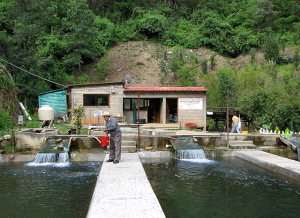Thinking about starting your own business? Great!
Now could be a great time for you to enter the aquaculture industry, as fish farming is a profitable business. Fish have high market value and demand in the United States, as well as a promising future as a source of income around the world.
If you have always dreamed of becoming an entrepreneur, this article will guide you and help you to make your dreams come true.
Before you start your business as a fish farmer, consider these steps and decide if fish farming is the best business for you.
Do you think fish farming is right for you? Please visit our Facebook page and leave your comment.
Here are 5 crucial things you must consider before starting your own fish farming business.
1. Do you have a suitable location?
 First, you need to consider your location. It’s important to determine whether you are in a suitable area for fish farming and are in compliance with your state and local laws.
First, you need to consider your location. It’s important to determine whether you are in a suitable area for fish farming and are in compliance with your state and local laws.
Take space into consideration. You will need space for your office, storage of inventory, your staff and a place to store your equipment.
If you feel that the location where you live is suitable or you could acquire suitable land for farming nearby, that’s great. You’ve checked the first criteria off your list!
2. Where can you gather knowledge?
Once you have found a suitable location for your business, you need to start soaking up as much knowledge about fish farming as you can before you actually start investing money in your business.
For learning about fish farming, you may visit several fish farms in your area or find online resources. There are several websites that can help you gather more knowledge about aquaculture. Go through some of the fish farming sites and learn about the pros and cons of the fish farming business. Visit this article to learn more about fish farming.
You will find several links at the end of this articles to guide you to more online resources for starting a fish farming business.
3. Do you need a Business Plan?
Before starting any business, you need to have a business strategy outlined. Your business plan should contain all necessary information about the structure of your company, your expenses, expected investment and anticipated return on your investment.
Take some time to consider all the possible expenses and be sure to include everything you’ll need to start your business in your plan.
Determine what you will need; how many staff, what equipment and supplies, your overheads, funds and assets. You will need your business plan to register your company as a corporation or proprietorship. It will also help you to attract investors and partners, apply for bank loans and government grants, as well as create a solid plan for you to follow as closely as you can.
It might be a good idea to consult a business consultant or attorney to help you with your necessary permits and paperwork. These experts will make it easier for you to form a company and comply with all the legal requirements.
4. How can you get funding?
 If you want to start a small scale or midsized business, you must have some funds saved up as your startup capital. If you don’t have enough experience in the industry, you should consider starting small and asking one of your friends with a little more experience to become your partner.
If you want to start a small scale or midsized business, you must have some funds saved up as your startup capital. If you don’t have enough experience in the industry, you should consider starting small and asking one of your friends with a little more experience to become your partner.
There are many benefits of a partnership business. You can gather funds much quicker that way. You also share liabilities.
If you don’t have enough money, you may apply for a business loan. Even if you don’t have good credit or if you don’t qualify for a traditional business loan, there are other ways to gather funds for your business.
Here are some alternate ways you could get funding:
- Borrow against your property: If you have property or valuables, you could borrow money against them. “Some banks offer home equity lines of credit that let you borrow up to as much as 75% of the appraised value of your home. “ – (businessknowhow.com)
- Sell your valuables: Look around and see if you have any belongings that you could sell to get some startup cash, like your old car, your old computer or furniture that you don’t need.
- Ask your friends and relatives: You might have a rich friend or a relative, like a rich uncle, who wouldn’t mind investing in your business or lending you the money to get started.
- Look for microloans: Microloans are available through a variety of sources. They could be through community sources, personal loans or through online sources. The terms of microloans, interests rates and eligibility varies from lender to lender.
- Government Funding: See if you can qualify for a small business loan from the government; you have a variety of options. Explore Loans, Grants & Funding | The U.S. Small Business Administration | SBA.gov
5. What about marketing?
Your marketing success will largely depend on how active you are in informing others about your new venture. Your connections with local businesses will be the most effective marketing tool for you at the beginning.
There are many ways to advertise your farm with very little cost.
 You can use the internet, social media platforms and other forms of media such as the newspaper, your local radio station, your city papers, bulletin boards and handmade signs and flyers to get customers to visit your farm.
You can use the internet, social media platforms and other forms of media such as the newspaper, your local radio station, your city papers, bulletin boards and handmade signs and flyers to get customers to visit your farm.
You can also use your farm as a storefront. If you are on a busy road, add some signage telling passers-by about your fish and encourage them to stop and buy some. For more marketing strategies, visit this blog.
I hope this article will help you to gather all the resources you need to start your own business in aquaculture. Now there is nothing that’s stopping you from becoming a business owner.
Before you start, you may also want to download our FREE eBook to Unleash the Entrepreneur in You! To learn more about fish farming or to get in touch with us, click here to book a meeting.
Please visit our Facebook page to leave a comment or add your comments in the comment box below.
Source: WorldWide Aquaculture




i want to know how we can start a fish farming. n how many days it will take , in how many days we can sell our stuff.can u help me and give me some details about fish farming
Thanks for your comment. Please call our office at 303-495-3705 or
email wayne@ecolonomics.org
Don’t count days when you’re into fish farming all you need is time
Dear farmer am very happy to know the 5steps about entering in fish bussness this will help to progress in my small raised fish pond.
Thanks for the feedback! We really do appreciate it. You can learn more from us at ceed.mykajabi.com and the Ecolonomic Action Team, including over 50 hours of webinar replays. Dr. Wayne Dorband has multiple lectures and courses available for access with a membership. Sign up today! Or you can access other great educational info at aquaculturecentral.smartmember.com for free!
Thanks for this handy information I concur with almost all of the points you have offered to us.
Cheers, Florence
Read above details and listings.
We are very much interested in starting up (from zero level) both Aquaculture – Fish Farming and Prawn/Shrimp Farming.
Planning to do in Zambia where the weather and water resources are better and initial research shows that there is a demand for that.
Anticipate starting as a small scale to get the grip of it and expand to the future.
We need both Technical Knowhow and any idea of you know anyone already doing this farming in Zambia.
Await your valued advice and knowledgebase with our proposals.
Thanks with Regards
Ann and Chithral
Chithral and Ann,
We certainly can help you with your aquaculture consulting needs. Here are several things we can do for you. First, we are going to make you a FREE member of our site where we teach courses and have live webinars about all kinds of aquaculture and agriculture. That site is called http://www.eatcommunity.com and you will get an email with login instructions.
Second, one of our staff will contact you and see about scheduling a brief FREE call or skype (for outside US) conversation. He will coordinate the timing for us.
Finally, on the http://www.eatcommunity.com site there is a questionnaire you should fill out to tell us a little about your aquaculture interests and needs. Please fill that out.
Areeb
can you assist me with those log in details also please, I am in south africa
I know fish forming is profitable, but site selection is a difficult task. I fill from the information that I can start this business properly. Only thing I will need guidance. In month or two I am going to start the pond digging.
Thank you for your advice.
We are very much interested in starting up an aquaculture- Fish farming specializing in prawns/shrimps and crabs(from zero level).
We need technical know-how and planning to do in Uganda where the weather and water resources are better.
We await your valued advice and knowledge-base.
Thanks with Regards.
Moureen and Sandra.
TESTIMONY ON HOW I GOT MY LOAN TO PAY MY BILLS (a2929leo@gmail.com)
Hello everyone,
I am Crystal A. Rogers lives in 303 Dye Street Superstition, AZ 85220,
Arizona in the United States. I’m writing this testimony to let everyone
know how blessed i am to have met Mr. Depuy of Access Point Loan Company
and what did for me and my family, when I have lost all hope he came and
make my family Come alive again by lending us $26,000.00 loan at a very low
interest rate of 2%. Well for the past four months I have been searching
for a loan to settle my debts all the loan companies I met scammed and took
my money until I finally met a God sent Lender. I never thought that there
are still genuine loan lenders on the internet but to my greatest surprise
i got my loan within 48 hours without
wasting much time so if you are out there looking for a loan of any amount
I would advise you to email the legit loan company via email: {a2929leo@gmail.com} or text (+14086769819 and be free of internet scams.
a2929leo@gmail.com
HOW DO FIND CUSTOMER OR FISH STORE TO BUY YOUR FISH
Visit alphalapia.com they are professional fish farm consultants.
Thanks for this handy information I concur with almost all of the points you have offered to us.thanks for sharing such amazing post.
For latedt news you have to pay a quuick visit world-wide-web and on web I found tjis web page as a most ezcellent site for moost up-to-date updates.
Hello, after reading this awesome paragraph i am also happy to share my familiarity here with
colleagues.
London escort service is second to none.
My brother recommended I would possibly like this website.
He was once entirely right. This put up truly made my day.
You can not believe just how so much time I had spsnt for this information! Thanks!
The increased risk of suicidal thoughts or behavior with AEDs was observed
as early as one week after starting drug treatment with AEDs
and persisted for the duration of treatment assessed.